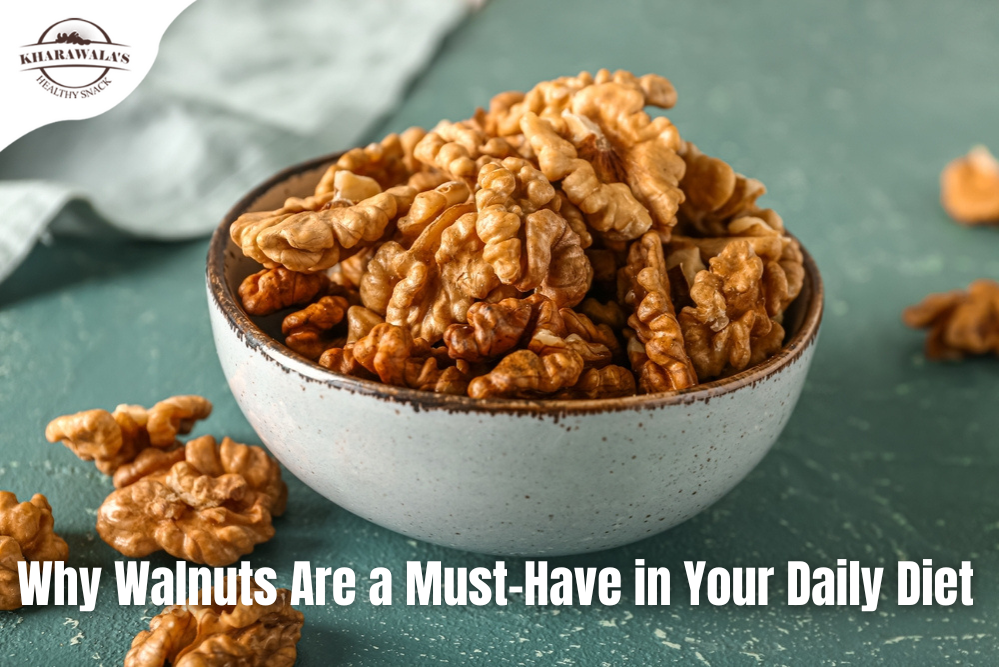
If there’s one nut that deserves a permanent spot in your daily diet, it’s the walnut. Often called a “brain-shaped” nut, walnuts are more than just a visual metaphor; they’re scientifically proven to support brain health, heart function, and overall well-being.
Let’s walk through why nutritionists and doctors alike recommend walnuts as a must-have superfood.
1. Rich Source of Omega-3 Fatty Acids
Walnuts are one of the best plant-based sources of omega-3, especially alpha-linolenic acid (ALA). Your body can’t make omega-3 on its own; it needs to come from food.
Why it matters:
- Supports brain function
- Helps reduce inflammation
- Lowers bad cholesterol
- Protects against heart disease
Just 2–4 walnut halves a day can fulfill your daily ALA requirement.
2. Great for Brain Health and Memory
There’s a reason walnuts look like tiny brains, they help fuel them.
Walnuts contain:
- Omega-3s that build brain cell membranes
- Polyphenols that protect against oxidative stress
- Vitamin E, folate, and melatonin all essential for cognitive function
Several studies have linked walnut consumption to improved memory, learning ability, and even reduced risk of age-related decline.
3. Boost Heart Health Naturally
If you’re looking for a heart-friendly snack, walnuts check every box. They help:
- Improve blood vessel function
- Reduce LDL (bad) cholesterol
- Raise HDL (good) cholesterol
- Lower blood pressure
The American Heart Association even gives walnuts a thumbs-up for their cardio-protective properties.
4. Packed with Antioxidants
Walnuts have more antioxidants than any other nut. These antioxidants:
- Help protect your cells from damage
- Reduce inflammation
- Strengthen immunity
This makes walnuts a powerful anti-aging food, too.
5. Supports Weight Management
Despite being calorie-dense, walnuts can help you control appetite and manage weight. Thanks to their fiber, protein, and healthy fat content, they help you feel full for longer, reducing the chances of overeating.
6. May Help Regulate Blood Sugar
For those managing diabetes or blood sugar levels, walnuts are a smart choice. They have:
- A low glycemic index
- Healthy fats that slow down sugar absorption
- Nutrients that support insulin function
How to Eat Walnuts Daily
You don’t need a large quantity, just 4–6 walnut halves per day can offer major health benefits.
Simple ways to include them:
- Eat them as-is in the morning
- Add to oats, smoothies, or salads
- Mix into trail mixes or granola
- Use crushed walnuts in chutneys or desserts
Nutritional Snapshot (Per 28g / ~7 whole walnuts)
| Nutrient | Approx. Value |
| Calories | 185 kcal |
| Protein | 4 g |
| Fat | 18 g (mostly healthy fats) |
| Carbohydrates | 4 g |
| Fiber | 2 g |
| Omega-3 (ALA) | 2.5 g |
| Vitamin E | 1% of daily need |
| Magnesium | 11% of daily need |
Conclusion: A Small Nut with Big Benefits
Whether you’re focusing on better brain function, a healthy heart, or simply want a more nutritious snack, walnuts are an easy and powerful addition to your daily diet. They fit into any lifestyle from keto and vegan to diabetic and heart-friendly diets.
Looking to include high-quality, fresh walnuts in your routine? Browse our handpicked selection at Kharawala Products and experience premium walnuts delivered to your door.
